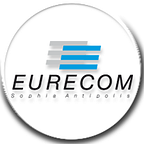[Meet our Faculty] EURECOM welcomes Arun PADAKANDLA as a Professor in the Communication Systems department
Q. Could you describe briefly your academic trajectory and working experience so far?
AP. I completed my master’s degree from the Institute of Science in Bengaluru in 2008. I then began my doctoral studies in electrical engineering at the University of Michigan, focusing on classical information theory and communication theory, in the field of EE systems. During my doctoral studies, I was awarded a Master of Science in Mathematics by the University of Michigan in 2013. I finished my Ph.D. program a year later. I then spent a year working at Ericsson Research in San Jose, California. This was a research team working on the development of protocols for the Internet of Things (IoT) and the then-current technologies. In 2015, I was awarded a prestigious postdoctoral fellowship from the National Science Foundation Centre for the Science of Information. This was a multi-university research initiative (MURI), to conduct research in the areas of information science, information theory, and understanding the theoretical foundations of information processing strategies. It was a grant that gave me the freedom to work with any university that was part of this centre. Since this centre was very well funded, it had university partners from Stanford, California, Berkeley, MIT, Purdue, and Illinois. I then worked at the University of Tennessee in Knoxville, a public university in the US, as a tenure-track assistant professor. This was my last position before being hired by EURECOM.
Q. What made you choose EURECOM and now that you’re here what is it that you like most?
AP. I always wanted to be at a good, prestigious research institute that could attract good students and have good, strong experts as colleagues on the faculty. In a sense, that was my “goal.” As far as I know, EURECOM is a prestigious institute in France, especially in the field of communication systems. It is considered one of the top schools in France, and it has made a good name for itself not only in France but throughout Europe. That is what brings me to EURECOM. EURECOM is considered one of the best top engineering schools in Europe, that is very attractive. I am definitely happy to be here!
Q. What kind of unique expertise do you bring to EURECOM and how do you think it will act as complementary to already existing expertise at EURECOM?
AP. I bring expertise in two new areas. I have expertise in information theory, particularly classical information theory. Information theory is a kind of theoretical framework within which today’s communication systems operate. In a sense, it is the framework or structure on which we build great communication systems. Hence, I have a great deal of expertise in theoretical information theory. No doubt there are also experts in communication systems, in developing practical communication systems, in developing networks, and in developing error control codes. However, I think the expertise in information theory is the core of information theory, which is the theoretical foundation, and that is an area of expertise that I bring to the department.
The other expertise that I bring, that is largely new to this region, is quantum information. I have been involved in quantum information for the last three to four years, and I have quite a few publications in that area. There is a tremendous interest in seeing “what” and “how” in a field called quantum information science. I work in quantum information science, and this is an area that is quite underrepresented in EURECOM and largely in this region. There are people working on experimental quantum devices here and in the area, but they are more concerned with theoretical aspects. That is another area of expertise that I bring to EURECOM.
Q. Do you see any possible collaborations with your department and with other departments?
AP. Now, there are quite a number of people here who, I would say, overlap in some ways. In the area of communication systems, I see collaboration with many researchers and especially Prof. Marios Kountouris, sharing interest in quantum information, as we have been in touch before I came here. Also, I would like to collaborate with the data science department, working on some theoretical aspects of data science. I have also been working on certain theoretical aspects of data science, learning theory, and a little bit on privacy.
Q.What are your future goals and if you had to sketch a five-year plan for your research goals, what would that be?
AP. My goals for the next five years would be to gain really strong expertise in different aspects of quantum information, especially quantum communication, quantum statistics, quantum probability, and quantum computing, and to take advantage of certain unique aspects of quantum states, such as entanglement, which is a unique aspect that is not present in today’s registers or in today’s classical information. When you work with quantum states, you can do certain things that you just can not do today.
The question really is: what are the things that can be done? What are the fundamental limits? What are the theoretical foundations for efficient quantum information processing strategies? The goal is to become an expert in the next five years, not just in France, but worldwide, in quantum information and quantum statistics. Obviously, it’s to solve important research problems, gain expertise, build a group of collaborators, and teach new things. That’s sort of the big goal.
